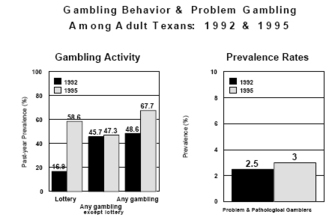The WAGER, Vol. 1(42) – The impact of a new gambling activity in Texas
A replication study among adult and adolescent Texans was conducted in 1992 and 1995 to examine, in part, the effect of a new gambling opportunity (lottery) on gambling behavior. The researchers were interested in the question of whether a new state lottery, which began in May 1992, would stimulate other gambling, replace gambling on other activities, or have no effect on other gambling. The 1992 telephone survey of 7015 adults (18 years and older) was repeated in 1995 with the same population, though not the same individuals. In 1992, 16.9% of respondents played the lottery in the past year, while in 1995 58.6% had played the lottery in the past year. The percentage of respondents who gambled on any activity increased from 48.6% in 1992 to 67.7% in 1995. However, the prevalence of those gambling on any activity other than the lottery remained relatively stable (45.7% to 47.3%). The authors concluded that the increase in all gambling was largely attributable to the initiation of the lottery. Introducing a lottery had no effect on the overall amount of gambling on other activities. Those who already gambled on activities other than the lottery added the lottery as one of their gambling activities. In addition, the lottery attracted a new group of gamblers who had not gambled on other activities in the past year. Despite the increase in gambling, the prevalence rates of problem and pathological gambling did not increase significantly.
Source: Adapted from Wallisch, L.S. (1996). Gambling in Texas: 1995 surveys of adult and adolescent gambling behavior, Executive Summary. Austin, TX: Texas Commission on Alcohol & Drug Abuse.
This public education project is funded, in part, by The Andrews Foundation.
This fax may be copied without permission. Please cite The WAGER as the source.
For more information contact the Massachusetts Council on Compulsive Gambling,
190 High Street, Suite 6, Boston, MA 02110.
